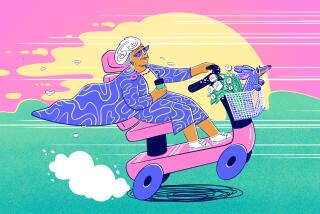It’s Important to Tamper With Neither Pride Nor Dignity of the Elderly
- Share via
A young friend told me the other day, in some agony, about the quandary he faced when he took his family to spend a recent weekend with his parents in another city.
“One of my dad’s things,” this young man explained, “is barbecuing outside. He loves to do it, and the weather was right, so he cooked steaks and baked potatoes on a portable outside grill. But he couldn’t get the coals started. He did everything wrong and they wouldn’t catch, and we waited and waited until he finally got them going.
“Nobody said anything to him, and I didn’t know what to do. He was always so good at this sort of thing. I learned how to do it from him. It really hurt me to see him bumbling around in a place he used to shine. And I didn’t know whether to step in and help him or not. What should I have done?”
The question came from a place of both love and anguish. And the experience was not uncommon.
It reminded me instantly of my own father and a lesson he taught me in adulthood that still smarts today.
A few years after my mother died, my brother and I visited my father with our families. We both lived in distant places, and it was a considerable occasion to my father to have us visit. The high point of the weekend was a Saturday night dinner at a local restaurant. His treat.
He presided proudly over the table, enjoying multiple grandchildren and basking in the simple fact of our being there. When after-dinner talk was over, he picked up the check and we all pushed back from the table to get into coats. My brother and I both saw the check, and both of us watched the tip he left. Our eyes met across the table as our father counted out the money. Outside, I pulled out a five-dollar bill, slipped it to my brother, and he nodded and went--he thought--surreptitiously back to our table.
In the parking lot, while our wives were putting children in the car, my father faced us.
His eyes were pained and moist.
“You shouldn’t have done that,” he said, as we scuffed the pavement like guilty schoolboys.
“I’ve been eating in fine restaurants all over this country all my life. This was my party, and I know how to tip properly. You shouldn’t have done that.”
And then he walked away.
The question of whether he left a satisfactory tip is moot. It was his party, on his turf, and he left what in his eyes was an appropriate tip. A mildly disappointed waitress was a small price to pay for the discomfiture of my father. We clouded a bright and shining day for him by interfering. And he was right; we shouldn’t have done it.
I told this story to my young friend, and he listened and seemed to feel better about his own actions. And after he left, I thought about this sensitive place of when to offer help to older people--and when not to.
If I could construct a rule of thumb, it would be simply this: Offer help when it is sought. And don’t when it isn’t.
Like any rule of thumb, this should be violated whenever circumstances dictate. But two qualities that need to be preserved, almost at any cost, in old people are pride and dignity. When those two qualities are put up against the impatience of younger generations, there should be no contest. Pride and dignity should win.
In the process of growing older, we experience both physical and emotional changes. Some of the motor reflexes simply don’t function as well as they used to. But at the same time, we are less emotionally motivated to make them function in the slick ways we once displayed.
Thus it’s quite possible that the father of my young friend once had part of his identity wrapped up in his barbecuing skills--and now they aren’t very important to him. This, combined with some possibly diminished motor skills, makes it look as if he’s bumbling.
So have another drink, and let him light the fire. And don’t despair for him. He’s okay. If he’s in real distress, he’ll ask for help. Then you can give it to him.
Meanwhile, enjoy that drink.


